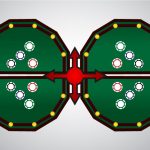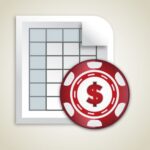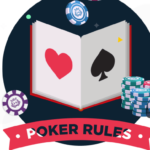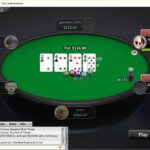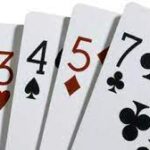I’m starting a new series which will cover all things Open Face Chinese Poker and be aimed at new players. It will be aptly named OFC Beginners Guide. If you’re hoping to learn how to play this crazy new game, then this guide should teach just that.
Part 1: Introduction
Part 2: It Starts with the Set
Discuss in our Forum
More parts coming soon.
Chinese Poker?
This guide is going to assume you know what Open Face Chinese Poker is and are looking to improve. If you’ve never played a hand of Chinese Poker and have no idea how it works, I recommend reading Open Face Chinese Poker: The Ultimate Guide first. This is a guide I wrote which explains the rules, dealing, scoring, points, etc. It gives a basic summary on how the game is structured and how to play. No reason to write the same thing twice.
Good vs Great OFC Players
Unlike forms of poker such as Texas Hold’em, there is no bluffing in OFC. There is also no betting. This greatly simplifies decision making. All in all, compared to a game like Omaha or Hold’em, OFC is pretty simple. People who are already good at other forms of poker should catch on quickly.
However, the difference between a good and great OFC player is pretty massive. A great player is someone who knows how to set up their hands, when to gamble, the EV of their moves, and is always aware of their outs. A great player thinks 5 moves ahead. This comes with learning and experience.
When you listen to great chess players talk their way through a match, they attempt to calculate not only the best move at any given moment, but the best move now and 5+ turns from now. Chess is a turn based game that requires you to out think your opponents. You both have the same pieces, with the same rules, and can make the same moves. It comes down to who makes the better moves. OFC isn’t as complex as chess, but there are similarities. When you set your hand, you’re thinking about how it will work with the 6th and 7th card you draw. When you place your 6th card, you’re building the foundation for your 7th-10th card. It’s not until the last couple of cards that it becomes a trivial decision, or at least easier to solve by math alone.
Don’t be Result Oriented
Like other poker games, you need to avoid being results oriented. You need to make the best play on every street with the information you have, and doing that enough times in the long run will earn you money. Don’t fret if you would have made a straight flush setting the 8 7
7 on the bottom, or if you would have made Fantasy Land by making a risky decision on 9th street.
on the bottom, or if you would have made Fantasy Land by making a risky decision on 9th street.
OFC is a very swingy game. You need a huge sample size before you can analyze your stats and decide if your play needs adjusting. 100-200 point swings are very common and should be expected. In my opinion, a minimum adequate sample size needed is 1,000 games. Anything less and you’re just guessing. You could be running hot and playing bad, or playing fine and running cold. Even 1,000 games is pretty low to extrapolate anything significant, but it at least gives you a starting point.
Count Your Outs
Another major difference between OFC and other forms of poker is every known card is exposed. Failure to use this information in your decisions will lead to you making bad plays. This also demonstrates the importance of being in position. For example, let’s say you’re dealt a hand like:





There are a few ways you could set this hand. You could go for the OESD on the bottom like:





However, if you were in position and saw villain was dealt:





You may want to think twice about the OESD set seeing as 3 of your 8 outs are dead. In this specific example, the 3 missing outs drop the percentage to hit your straight by about 17%. (There will be more on the math and calculations of outs later.)
This doesn’t stop at sets either. As you keep gathering new information on which cards are left, you should adjust your strategy. If you’re playing 3 or 4 handed, the amount of known cards is far greater, so you need to pay even more attention.
Barry Greenstein coined the terms “Totally Live” for a card that has not been played at all, “Live” for a card that has been played once, “Dead” for a card that has been played twice, and “Totally Dead” for a card that is spent. In other words, if you draw a 9, and there are no other 9s showing, that 9 is totally live meaning there are three other 9s out there. If you draw a Jack and your opponent has 2 Jacks, that Jack is dead meaning there is only one Jack left in the deck.
2-4 Players
OFC can be played heads up, or 3 and 4 handed. Heads up tends to be the most common, and that is what most of my thinking will focus on in this series. I have also played a lot of 3 and 4 handed play, and the game is much different than heads up. The stakes increase simply because you have to pay out more players or are paid by more players. If you foul heads up, often you will only be paying 6 points. But a foul 4 handed can cost you 18+. The button becomes much more valuable because you see so many more cards. The more information you have, the more perfect you need to play.
Practice, Practice, Practice
The only way you’re going to get better is like any activity; play more and play often. If you don’t have any friends to play against, or need to practice between your home games, you can play OFC right here on FTR. Play against someone on FTR, or challenge our ever improving AI, Wazzup who can play both regular OFC and pineapple OFC.
As you practice, don’t be afraid to post your questionable hands in our OFC forum. Our members will analyze your play and help you spot any leaks. Our OFC game also has buttons built in allowing you to click once to post a hand to gain feedback on your set, or how you played the entire hand. To do this, click on “Did I set it right?” or “Did I play it right?” at the end of the round.
Discuss in the FTR Forums
This was just a general introduction to Open Face Chinese, and I expect this to end up being a 10-12 part series covering various topics. If you have any questions, feedback, or criticism, please feel free to leave a comment below, or discuss in this thread.
Submit your review | |



